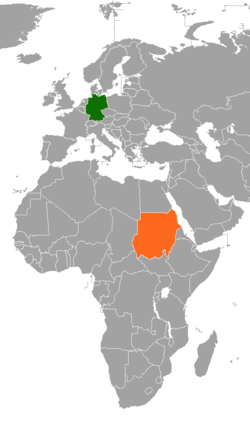Germany–Sudan relations
 | |
Germany |
Sudan |
|---|---|
Germany–Sudan relations are the
History
In 1843, a
The Federal Republic of Germany (FRG) established a diplomatic liaison office in Khartoum in 1955, which became a
In 2012, the German Embassy in Khartoum was stormed and set on fire by demonstrators. This was due to previous demonstrations in Germany by the far-right minor party Pro NRW, which had featured cartoons and depictions of Muhammad.[3]
Protests began in Sudan in 2018, and dictator al-Bashir was eventually overthrown in a
Economic relations
Economic relations between the two states are rather underdeveloped. The total volume of German trade with Sudan amounted to 128 million Euro in 2021, putting Sudan in 134th place in the ranking of German trading partners.[4] Germany imports mainly cotton, rubber and foodstuffs from Sudan. In return, Sudan imports mainly industrial and chemical products from Germany.[5] Occasionally, German companies are involved in projects in the country. For example, the German company Lahmeyer was involved in the construction of the Merowe Dam.
Development cooperation
Germany does not provide direct bilateral development assistance to Sudan after development cooperation briefly resumed in 2019. However, Germany provides aid through European Union (EU) and United Nations (UN) programs and direct humanitarian assistance to refugees.[1]
Migration
There are sporadic applications for asylum from Sudanese in Germany.[6] In 2021, there were approximately 8500 Sudanese living in Germany.[7] Well-known German-Sudanese include television presenter and singer Nadja Abd el Farrag and football player Hany Mukhtar.
Cultural relations
A Goethe-Institut has been active in Sudan again since 2008. German culture and science have a good reputation in Sudan and some Sudanese professionals have worked or studied in Germany. German has been offered as a foreign language at Sudanese universities since 1990, and the German Academic Exchange Service promotes exchange at the academic level. Close relations also exist between the Sudanese Antiquities Service and various German archaeological institutions. German experts are involved in the maintenance and conservation of important Sudanese cultural sites such as those in Naqa and Musawwarat es-Sufra.[5]
Diplomatic missions
Individual references
- ^ a b c d e "Germany and Sudan: Bilateral relations". German Federal Foreign Office. Retrieved 2022-11-09.
- ^ a b "Deutsch-sudanesische Beziehungen - pangloss.de". www.pangloss.de. Retrieved 2022-11-09.
- ISSN 2195-1349. Retrieved 2022-11-09.
- ^ "Rangfolge der Handelspartner im Außenhandel" (PDF). Statistisches Bundesamt. Retrieved 2022-09-30.
- ^ a b "Sudan: Beziehungen zu Deutschland" (PDF). Retrieved 2022-10-29.
- ^ "Flüchtlinge aus dem Sudan: Zahlen und Entwicklung" (in German). Retrieved 2022-10-29.
- ^ "Ausländer in Deutschland bis 2021: Herkunftsland". Statista (in German). Retrieved 2022-11-09.
- ^ Germany and Sudan: Bilateral relations
- ^ "Sudan". Auswärtiges Amt (in German). Retrieved 2022-11-09.


